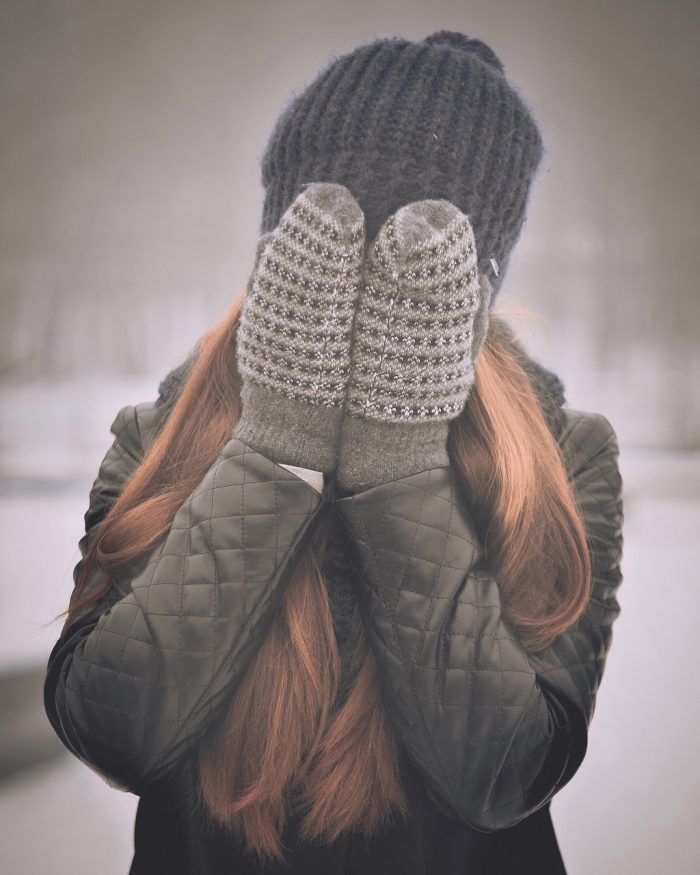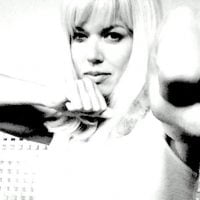Social anxiety wasn’t a term I knew until my late teen years, but one that I instantly realized applied to me.
For as long as I could remember, I felt uncomfortable when I received a lot of attention… particularly from strangers or groups. My family called it “shy” and it started when I was small. One of my earliest memories is being age 3 and trying to hide under my mother’s dress, when some friends of hers tried to talk to me. We were standing on the beach and I wished I could sink into the sand.
My mom seemed strong and tall as an oak tree, so I gripped her leg and tried to hide my face. Everyone laughed… as she tried to extract me and make small talk. “She’s shy.” someone likely said, as people were always saying that about me. “She is so quiet.” teachers would write in my report cards, which seemed incongruent with the social butterfly I was around my nearest and dearest.
Then, there was the blushing. My god, the blushing! Pink cheeks may seem cute or charming when it happens to someone else, but -for me- it was an internal battle and I fought it alone. The heat would radiate across me if I just thought about raising my hand in class. I would be beet red before I had an oral presentation. When talking in front of a group, I would shake and feel as if I was about to pass out. A globus sensation would emerge in my throat and I’d croak out the words, turning as red as an ambulance. Ambulance red felt appropriate, since I felt like I’d need a real ambulance from the embarrassment of being on display.
Once I was older and public speaking became a requirement in my classes at school, I would beg my mom to stay home. Sensing my distress, she’d let me. I owe my high school french teacher a debt for knowing not to call on me when I didn’t make eye contact. If I gave a wrong answer, I would berate myself in my mind.
According to the definition adapted by the National Institute of Mental Health, (https://www.nimh.nih.gov/health/statistics/social-anxiety-disorder.shtml) social anxiety disorder “is characterized by persistent fear of one or more social or performance situations in which the person is exposed to unfamiliar people or to possible scrutiny by others. The individual fears that he or she will act in a way (or show anxiety symptoms) that will be embarrassing and humiliating.”
My social anxiety always felt ironic, as (when I interacted with people one on one) I did better. I was a talker but groups brought out my worst. Another aspect of social anxiety was worrying about what I said, after the fact. I’d go over truths I’d shared or jokes I made and feel ripe with humiliation.
I can’t help but wonder if much of this was fueled by my experience as a toddler. I had a bright red hemangioma birthmark on my cheek, which wasn’t removed until I was an adult. People would stare and ask about it. Others spoke about it in front of me. One doctor accused my parents of beating me, when he first saw the red mark on my young face. I felt like an ugly duckling that would never be a swan.
Finally, things began to improve when I was attending college. One requirement for my A.A. degree was to take a speech class. I made up my mind that even if I felt or looked like I was about to die from the fire of my blush, my heart beating, or my throat feeling like it was closing in… I would stare straight at the audience and continue to speak. I reminded myself that I wouldn’t see most of those classmates again and that it was worse for them, than me. I say this as, based on the looks they gave me, it was incredibly painful to watch someone struggle as much as I did when in front of a group. Each oral presentation or speech, a few mouths would open at the shock of watching me.
Soon enough, my love of writing propelled me toward the poetry community and I was asked to read my poems aloud. One poetry workshop had us read at a local bookshop, as part of our final grade. After I finished reading 2 poems, a boy my age walked up to me in the aisle and said, “You’re ugly.” I guess he figured he was being witty, referencing my self deprecating description in one of my pieces. It was my worst fear come true, yet I stared him straight back in the eye and said, “Thank you.”
Once I entered my early 20’s, my doctor offered me a beta blocker for public speaking. He told me that I’d still feel nervous but not shake. It helped, but my already low blood pressure felt too low when I took it. Yoga is what finally helped me conquer the battle. The great thing about teaching yoga is that people are there for their own internal experience. Even if you’re the teacher, you are just part of their overall experience and not their main focus. Best of all, you don’t get too many people staring at you when they’re in downdog.
This doesn’t mean I’m cured of my social anxiety, but I do try and avoid letting it own me and every year I feel stronger than the year before. I’m fine in relaxed social settings or work related meetings, but groups where I have to share about myself or read material aloud are hard. About 5 years ago I got stage fright at one crowded yoga teacher audition and fell out of Virabhadrasana III. The other people auditioning looked a little shocked and, needless to say, I didn’t get the job. However, I can laugh about it now. If my nerves help others realize it’s okay to mess up or look embarrassed, great. We are each complex and I don’t need to be as skilled on stage as J-Lo. I can seem natural and posed in one setting and flustered in another. To be honest, I still mostly avoid settings where I public speak. Teaching a small group of people may always be more comfortable for me than a large one.
Best of all, I don’t blush anymore… unless my fiancé makes a flirty comment or I go on a jog.









Read 0 comments and reply